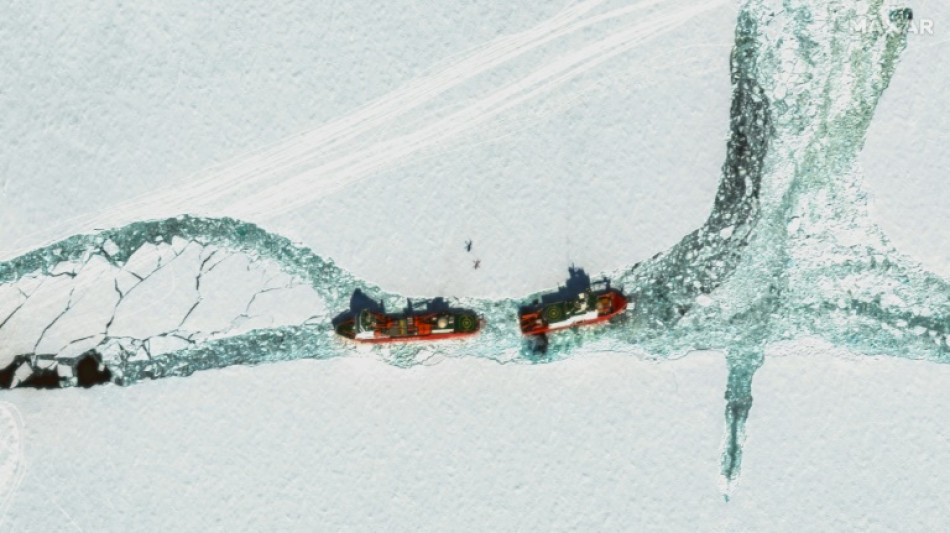
-
 Man City eye Premier League title twist as pressure mounts on Frank and Howe
Man City eye Premier League title twist as pressure mounts on Frank and Howe
-
South Korea police raid spy agency over drone flights into North

-
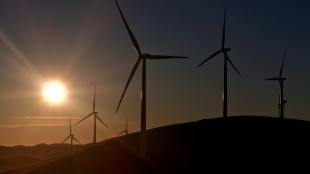 Solar, wind capacity growth slowed last year, analysis shows
Solar, wind capacity growth slowed last year, analysis shows
-
'Family and intimacy under pressure' at Berlin film festival

-
 Basket-brawl as five ejected in Pistons-Hornets clash
Basket-brawl as five ejected in Pistons-Hornets clash
-
January was fifth hottest on record despite cold snap: EU monitor
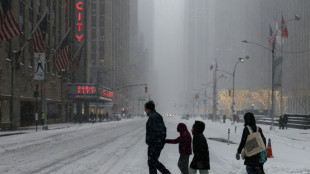
-
 Asian markets extend gains as Tokyo enjoys another record day
Asian markets extend gains as Tokyo enjoys another record day
-
Warming climate threatens Greenland's ancestral way of life
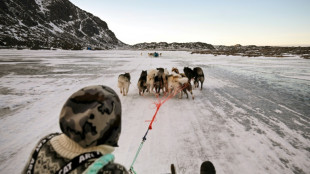
-
 Japan election results confirm super-majority for Takaichi's party
Japan election results confirm super-majority for Takaichi's party
-
Unions rip American Airlines CEO on performance
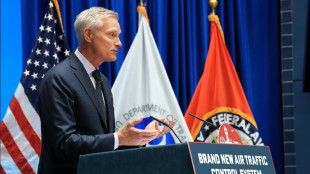
-
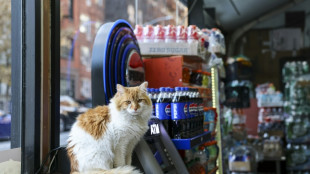 New York seeks rights for beloved but illegal 'bodega cats'
New York seeks rights for beloved but illegal 'bodega cats'
-
Blades of fury: Japan protests over 'rough' Olympic podium

-
 Zelensky defends Ukrainian athlete's helmet at Games after IOC ban
Zelensky defends Ukrainian athlete's helmet at Games after IOC ban
-
Jury told that Meta, Google 'engineered addiction' at landmark US trial

-
 Despite Trump, Bad Bunny reflects importance of Latinos in US politics
Despite Trump, Bad Bunny reflects importance of Latinos in US politics
-
Australian PM 'devastated' by violence at rally against Israel president's visit

-
 Vonn says suffered complex leg break in Olympics crash, has 'no regrets'
Vonn says suffered complex leg break in Olympics crash, has 'no regrets'
-
YouTube star MrBeast buys youth-focused banking app

-
 French take surprise led over Americans in Olympic ice dancing
French take surprise led over Americans in Olympic ice dancing
-
Lindsey Vonn says has 'complex tibia fracture' from Olympics crash
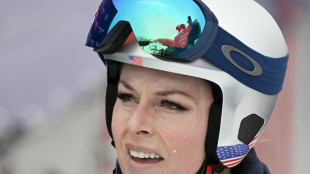
-
 US news anchor says 'hour of desperation' in search for missing mother
US news anchor says 'hour of desperation' in search for missing mother
-
Malen double lifts Roma level with Juventus

-
 'Schitt's Creek' star Catherine O'Hara died of blood clot in lung: death certificate
'Schitt's Creek' star Catherine O'Hara died of blood clot in lung: death certificate
-
'Best day of my life': Raimund soars to German Olympic ski jump gold
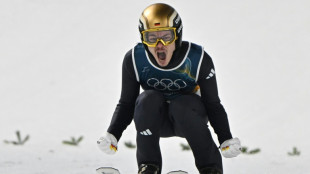
-
 US Justice Dept opens unredacted Epstein files to lawmakers
US Justice Dept opens unredacted Epstein files to lawmakers
-
Epstein taints European governments and royalty, US corporate elite

-
 Three missing employees of Canadian miner found dead in Mexico
Three missing employees of Canadian miner found dead in Mexico
-
Meta, Google face jury in landmark US addiction trial

-
 Winter Olympics organisers investigate reports of damaged medals
Winter Olympics organisers investigate reports of damaged medals
-
Venezuela opposition figure freed, then rearrested after calling for elections

-
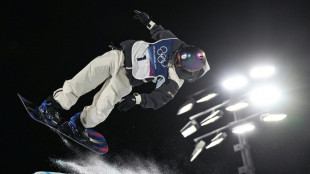 Japan's Murase clinches Olympic big air gold as Gasser is toppled
Japan's Murase clinches Olympic big air gold as Gasser is toppled
-
US athletes using Winter Olympics to express Trump criticism

-
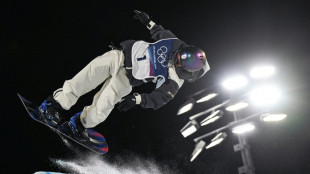 Japan's Murase clinches Olympic big air gold
Japan's Murase clinches Olympic big air gold
-
Pakistan to play India at T20 World Cup after boycott called off

-
 Emergency measures hobble Cuba as fuel supplies dwindle under US pressure
Emergency measures hobble Cuba as fuel supplies dwindle under US pressure
-
UK king voices 'concern' as police probe ex-prince Andrew over Epstein

-
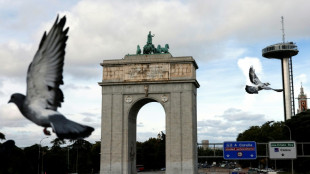 Spanish NGO says govt flouting own Franco memory law
Spanish NGO says govt flouting own Franco memory law
-
What next for Vonn after painful end to Olympic dream?

-
 Main trial begins in landmark US addiction case against Meta, YouTube
Main trial begins in landmark US addiction case against Meta, YouTube
-
South Africa open T20 World Cup campaign with Canada thrashing

-
 Epstein accomplice Maxwell seeks Trump clemency before testimony
Epstein accomplice Maxwell seeks Trump clemency before testimony
-
Discord adopts facial recognition in child safety crackdown

-
 Some striking NY nurses reach deal with employers
Some striking NY nurses reach deal with employers
-
Emergency measures kick in as Cuban fuel supplies dwindle under US pressure

-
 EU chief backs Made-in-Europe push for 'strategic' sectors
EU chief backs Made-in-Europe push for 'strategic' sectors
-
Machado ally 'kidnapped' after calling for Venezuela elections

-
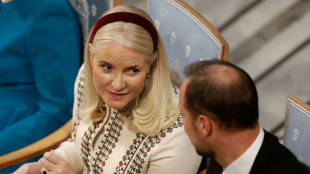 Epstein affair triggers crisis of trust in Norway
Epstein affair triggers crisis of trust in Norway
-
AI chatbots give bad health advice, research finds

-
 Iran steps up arrests while remaining positive on US talks
Iran steps up arrests while remaining positive on US talks
-
Frank issues rallying cry for 'desperate' Tottenham


Despite record low ice, nations again fail to agree Antarctic reserves
A multinational group on Antarctic conservation failed to break a years-long deadlock and agree new marine reserves in the region, despite record low ice, environmental groups said Friday.
The Commission for the Conservation of Antarctic Marine Living Resources ended a fortnight of meetings in Australia once again unable to reach a deal on three new marine protected areas (MPAs).
The proposed sanctuaries around Antarctica would safeguard nearly four million square kilometres (1.5 million square miles) of ocean from human activities, in the largest act of ocean protection in history.
"It's frustrating that discussions for MPAs have been ongoing for more than a decade and utterly disappointing that CCAMLR has been unable to make significant progress again, particularly following a year of unprecedented and concerning change for Antarctica," said WWF's Antarctic conservation manager Emily Grilly.
The areas were first proposed in 2010, before being scaled down in 2017, in an attempt to win more support.
But their creation has persistently been blocked by China and Russia, including most recently at the commission's June meeting in Chile.
NGOs including WWF had expressed hope that the commission might now act given record low levels of sea-ice in the region and evidence of "mass deaths of vulnerable species".
Greenpeace said the gridlock was all the more notable given successful negotiations to reach the UN ocean treaty earlier this year.
"Another year, another failed Antarctic Ocean Commission meeting. The Commission can always agree to new fishing licenses, but can’t agree on a concrete pathway forwards on protection," said Jehki Harkonen, Greenpeace International's ocean policy advisor.
CCAMLR did not immediately publish a statement on the outcome of its meeting.
- Rapidly changing region -
The proposed protected areas would have limited human activity, particularly fishing, and environmentalists say they would be key to helping species recover in the rapidly changing region.
"We can't stop all the effects of climate change in the short term, but we can take the pressure off in other ways," Grilly said.
But there has historically been little appetite for the project from Beijing and Moscow, who have expressed concerns about compliance issues and fishing rights.
The CCAMLR, which regulates fisheries, is comprised of 26 member countries plus the EU. They include the United States, Russia, China, the UK, France, India, Japan, host Chile, Brazil and South Africa.
This year, sea ice around Antarctica hit its lowest winter levels since records began 45 years ago, the US National Snow and Ice Data Center said.
The measurement was preliminary, as continued winter conditions could cause additional ice formation, but it correlates with a trend of declining ice seen since August 2016.
There is debate among scientists over the cause of the shift, with some reluctant to establish a formal link with global warming.
Climate models have struggled in the past to predict changes in the Antarctic ice pack.
The effect on wildlife in the region is already clear, however, with scientists in August reporting a "catastrophic breeding failure" of emperor penguins as sea ice gave way beneath fledgling chicks.
Thousands of baby penguins are believed to have died, with all but one of five sites monitored by scientists experiencing 100 percent loss.
P.Costa--AMWN



